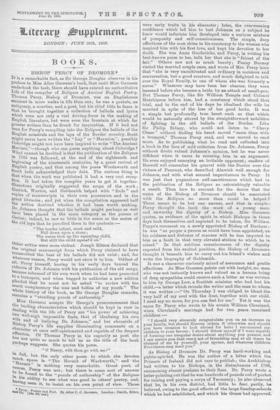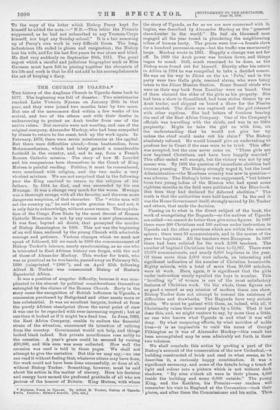BOOKS.
BISHOP PERCY OF DROMOTt.*
IT is a remarkable fact, as Sir George Douglas observes in his preface to Miss Alice Gaussen's book, that until Miss Gaussen undertook the task, there should have existed no authoritative Life of the compiler of Reliques of Ancient English Poetry. Thomas Percy, Bishop of Dromore, was an Englishman eminent in more walks in life than one; he was a prelate, an
antiquary, a courtier, and a poet, but his chief title to fame is that he brought together a collection of ballads and lyrics which were not only a real driving-force in the making of English literature, but were even the fountain at which far greater writers than he drank for inspiration. If it bad not been for Percy's compiling into the Reliques the ballads of the English minstrels and the lays of the Border country, Scott might never have mitten the "Lay" or " Marmion"; possibly Coleridge might not have been inspired to write "The Ancient Mariner,"—though who can guess anything about Coleridge ? What cannot be doubted is that the publication of the Reliques in 1765 was followed, at the end of the eighteenth and beginning of the nineteenth centuries, by a great revival of English poetry, and that among the poets Wordsworth and Scott both acknowledged their debt. The curious thing is that when the work was published it had a very cool recep- tion. It bad taken the compiler years to get it together. Shenstone originally suggested the scope of the work ; Garrick, Warton, and Goldsmith helped with " finds" and conies of manuscripts in their own possession and in the great libraries ; and yet when the compilation appeared half the critics doubted whether it bad been worth making. have Johnson thought that the ballads might perhaps as well care been placed in the same category as the poems of
,Cacian; indeed, he saw so little in the sense or the metre of Ihe old lays that he parodied them in the quatrain:— " The tender infant, meek and mild, Foil down upon a stone ;
The nurse took up the squealing child, But still the child squeal'd on." Other critics were more violent. Joseph Ritson declared that the original manuscript from which Percy claimed to have transcribed the beet of his ballads did not exist ; and, for whatever reason, Percy would not show it to him. Oddest of all, Percy himself, having in his early days braved the ridicule of Dr. Johnson with his publication of the old songs, became ashamed of his own work when he bad been promoted to a bishopric, and when begged to authorise a new edition Pleaded that he must not be asked "to review with too much complacency the sins and follies of my youth." The whole history of the book, as 'Sir George Douglas remarks, remains a "standing puzzle of authorship." Miss Gaussen accepts Sir George's pronouncement that the leading characteristice which should be kept in view in dealing with the life of. Percy are " his power of achieving two well-nigh impossible feats, that of idealising his own
_Nvi.fe and of bullying Dr. Johnson," and her chronicle of .Bishep Percy's life supplies illuminating comments on a
character at once self-opinionated and capable of the deepest affection. Of Thomas Percy in his capacity as poet she has not quite so much to tell us as the title of the book perhaps suggests. She quotes his poem,
"O Nancy, wilt thou go with mo?" in full, but the only other poem to which she devotes
,much apace " The Hermit of Warkworth," and the
" is nothing very remarkable. Great poet, of .,"_11,roe, Percy was not; but there is some sort of answer sb° b‘ e. found to the "puzzle of authorship" of the Reliques
hut ability to see what was good in others' poetry, and, having seen it, to insist on his own point of view. Those
_MP Prelate and Poet. By Alice C. C. Gamow]. London, Smith, Elder, "3. L194, ea. net.]
were early traits in his character ; later, the overweening confidence which led him to bait Johnson on a subject he knew would infuriate him developed into a curious mixture of pomposity and self-consciousness. The simple, deep affections of the man shine in his constancy to the woman who inspired him with his first love, and kept his devotion to her death. She was Anne Gooderiche, and Percy, in writing his best-known poem to her, tells her that she is "fairest of the fair." Others saw not so much beauty; Fanny Burney visited the married couple once, and wrote of Mrs. Percy later that " she is very uncultivated and ordinary in manners and conversation, but a good creature, and much delighted to talk over the Royal Family, to one of whom she was formerly a nurse," Whatever may have been her charms, they were lessened before she became a bride by an attack of small-pox. But Thomas Percy, like Sir William Temple and Colonel Hutchinson before him, had a constancy which stood that trial, and to the end of his days he idealised the wife he married in spite of the loss of her good looks. It was a simple but profoundly true heart such as that which would be naturally stirred by the straightforward nobilities of fighting in the old ballads of the Border. Like Sir Philip Sidney, who could not listen to " Chevy Chase " without finding his heart moved " more than with a trumpet," Thomas Percy read, and was moved to read more. As to publishing what ho read and collected into a book in the face of cold criticism from Dr. Johnson, Percy without doubt valued Johnson's opinion, but he was never diffident when it came to crossing him in an argument.
He even enjoyed annoying an irritable opponent; readers of Boswell will remember his quarrel with the Doctor over the virtues of Pennant, who described Alnwick well enough for Johnson, and with what seemed impertinence to Percy. It was just that pugnacious self-assertiveness which had in the publication of the Reliques so astonishingly valuable a result. Then how to account for the desire that the name of the Bishop of Dromore should be associated with the Reliques no more than could be helped ? There seems to be but one answer, and that is simple: Percy thought the book the work of a young man, and unworthy the dignity of a Bishop. Miss Gaussen quotes, as evidence of the spirit in which Bishops in those days took themselves and expected to be taken, Sir William Pepys's comment on a newly appointed Bishop of Durham : he was "as proper a person as could have been appointed, as his coldness and distance of manner will be less imputed to him as a fault in that very elevated station to which be is raised." In that sublime consciousness of the dignity expected from his exalted position, the Bishop of Dromore thought it beneath Min to carry out his friend's wishes and write the biography of Goldsmith.
It was a character curiously mixed of assurance and gentle affections. As Miss Gaussen points out with insight, no man who was not instantly known and valued as a human being of deep sympathies could receive such a letter as was written to him by George Low, a Scottish minister who had lost his child,—a letter which reveals the writer and the man to whom it was written :—" On Thursday I was obliged to blend the very half of my soul with the dust, together with our child. I need say no more, for you can feel for me." 'Yet it was the same Dr. Percy who wrote to his cousin William Cleveland, when Cleveland's marriage had for two years remained childless :-
" I should very sincerely congratulate you on an increase in your family, but should Heaven ordain it otherwise and should you have occasion to look abroad for heirs I recommend my children to your favour; I should detest myself if I were capable of forming one irregular desire about anything you possess, and I can assure you that every act of friendship may at all times be claimed of mo by yourself, your spouse, and whatever children Providence may send you."
As Bishop of Dromore Dr. Percy was bard-working and public-spirited. He was the author of a letter which the Primate of Ireland did not care to publish; the Archbishop bad written to his Bishops, in the disturbances of 1798, summoning absent prelates to their Sees, Dr. Percy wrote a letter pointing out that he was hundreds of pounds out of pocket for raising and paying a corps of Yeomanry; be also observed that be, in his own district, had little to fear, partly, he believed, owing to the good effects of the large Sunday-schools which he bad established, and which his Grace had approved. To the copy of the letter which Bishop Percy kept for himself ho added the note :—" N.B.—This letter the Primate suppressed, as ho had not subscribed to any Yeoman-Corps himself, nor kept any Sunday-school." It is a fair summing up of Percy's own work in very difficult times. The long, industrious life ended in gloom and resignation; the Bishop lost his wife, and for his last five years be was alone and blind. He died very suddenly on September 30th, 1811. The groat regret which a careful and judicious biographer such as Miss Gaussen must have felt in piecing together the chronicle of his life and work is that he did not add to his accomplishments the art of keeping a diary.



























































 Previous page
Previous page